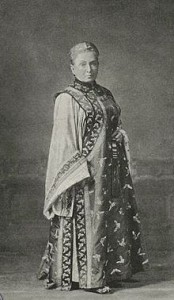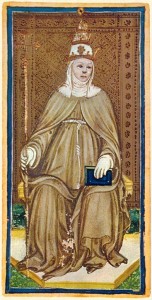For her senior thesis project, Annie Szeliski is serving as both the dramaturge and stage manager for Caryl Churchill’s Top Girls. Below is a portion of her research on the historical and political context of the play.
By the early 1980s the feminist movement in Britain had been flourishing for two decades, yet it began to take on a different focus. With the appointment of Britain’s first female Prime Minister—Margaret Thatcher—the feminist movement began to assume a more individualistic focus. Terms like “enterprise culture,” “superwoman,” and “pulling oneself up by one’s bootstraps” were seen as encouraging phrases in a society that expected everyone to fight for themselves and deemed those unable to do so “lazy” and “weak.”

Survival of the fittest is a central theme in Top Girls. The fabulous yet controversial Caryl Churchill wrote Top Girls in 1982 amidst a decade of social upheaval. The play opens with a scene of famous women (both real and imagined) from across the centuries dining together in celebration. These women all share the similar trait of perseverance: whether it is Isabella Bird the famous Victorian explorer who continued to travel despite her illness, Lady Nijo a 12th Century Buddhist Nun who walked the length of Japan, Pope Joan of the 9th century, who despite her gender rose to be the head of the Catholic Church, or Marlene, the heroine of the play, a young executive of the 1980’s recently promoted to Marketing Director. These women banter in overlapping dialogue, telling tales of their struggles and perseverance as women trying to live in a “man’s” world.

After seeing the first act, it would be easy to categorize Top Girls as just another feminist play about angry women, but to do so would narrow its scope and miss many of the values the play has to offer. The play is not just about gender inequality. Top Girls is a political and social play that addresses other issues in addition to gender, and is especially relevant on campus this semester due to the raised awareness around issues of economic diversity and inequality.
While Act I centers on those able to “pull themselves up,” Act II focuses on those unable to improve their situations. Through the characters of Joyce and Angie, we see the dichotomy that plagued Britain in the 80s: the supposed accessibility of success, versus the difficulties of actually achieving it.
One of the marvelous things about Caryl Churchill is her ability to accurately portray an issue without expressing her own personal beliefs in her playwriting. As such she encourages discussion rather than forcing her beliefs on the audience. She says, “I quite deliberately left a hole in the play, rather than giving people a model of what they could be like. I meant the thing that is absent to have a presence.”
Top Girls was written in 1982 and my sincerest hope is that one day the play will be considered “dated;” that one day sexism and classism will be things that we read about in history books. Unfortunately, these issues are as relevant today as they ever were. We hope our production can continue a conversation, which Churchill addressed thirty years ago but still continues today.